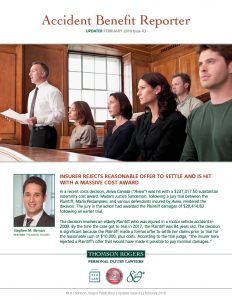INSURER REJECTS REASONABLE OFFER TO SETTLE AND IS HIT WITH A MASSIVE COST AWARD
Author(s): Stephen M. Birman*
February 1, 2018
In a recent costs decision, Aviva Canada (“Aviva”) was hit with a $237,017.50 substantial indemnity cost award. The decision was rendered by Madam Justice Sanderson following a jury trial between the Plaintiff, Maria Persampieri, and various defendants insured by Aviva. The jury in the action had awarded the Plaintiff damages of $20,414.83 following an earlier trial.
The decision involves an elderly Plaintiff who was injured in a motor vehicle accident in 2009. By the time the case got to trial in 2017, the Plaintiff was 84 years old. The decision is significant because the Plaintiff made a formal offer to settle her claims prior to trial for the reasonable sum of $10,000, plus costs. According to the trial judge, “the insurer here rejected a Plaintiff’s offer that would have made it possible to pay minimal damages.”
In Ontario, the unsuccessful party in litigation is typically required to pay part of the successful party’s legal costs. In circumstances where the successful party offers to settle a claim for less than the amount they are awarded at trial (as was the case here), the losing party is required to pay nearly all of the successful party’s legal costs.
In the 8 years lead up to a trial, Aviva made no offers to settle the claim. To the contrary, Aviva’s counsel advised Plaintiff’s counsel that it had an internal system of assessing motor vehicle accident claims and that it would not be willing to offer even $1.00 to resolve the claim. Plaintiff’s counsel was advised that once this internal decision was made nothing along the road to trial could be done to alter that.
Fortunately, for the Plaintiff, she was successful at trial and the jury awarded her an amount that exceeded her offer to settle by more than 2 times.
After the trial, submissions were made regarding the insurer’s payment of the Plaintiff’s legal costs. The Plaintiff, having “beat her offer”, rightfully sought substantial indemnity costs for the significant legal expenses associated with advancing her claim through trial.
Aviva argued that any costs awarded should be modest and not disproportionate to the amount awarded by the jury.
The Judge noted that the proportionality principle is generally invoked to foster access to justice, “however a strict application of the proportionality principle here could work against the achievement of that goal and have the opposite effect,” as Aviva was a “sophisticated insurer that made a tactical decision to reject a Plaintiff’s formal Rule 49 Offer to Settle, understanding the risk in costs that it was taking by doing so.”
The Judge astutely stated that to sanction under compensation of the Plaintiff’s costs that were legitimately incurred could generally discourage plaintiffs with modest claims, from pursuing them at all.
The Judge was also critical of Aviva’s early and unalterable decision in the litigation not to pay any tort damages. Justice Sanderson stated that “adoption of such an unalterable decision-making process would render meaningless and make a mockery of the pretrial resolution process, aimed as it is, at encouraging and effecting settlement to avoid unnecessary trials.”
The Judge concluded the discussion by stating that, “total unwillingness to reassess/discuss settlement based on full information and advice should not be sanctioned in any way (including by sheltering insurers from the foreseeable costs consequences of such a decision should it fail to yield a result favourable to an insurer in a particular case.)” In my view, this decision harshly (but correctly) indicts the insurer’s approach and conduct in this litigation.
From my perspective, there are many interesting aspects to this decision, including the following:
- The Judge’s criticism of an insurer for a “total unwillingness to reassess/discuss settlement based on full information and advice.
The decision draws into focus the strategy of the insurer of not only resisting a claim that turned out to be meritorious but adopting an approach at the outset (8 years prior to trial) that it would not reconsider along the way. The very nature of entering into a litigation process with a closed mind and unwillingness to consider new information and assess your position accordingly was strongly and correctly disparaged by the Judge. - The Plaintiff’s willingness to take a substantial risk.
It cannot be lost that this 84-year-old Plaintiff was taking a substantial risk in pursuing this modest claim to trial. As easily as she beat her offer by $10,000, she could have been awarded a sum less than her offer. In that case, the insurer would have insisted on its costs. The unbalanced risk/benefit proposition ($20,000 in damages awarded versus the potential to have to pay 6 figures in legal costs) would put enormous pressure on most plaintiffs. - The outcome demonstrates the primary problem with the current contingency fee rules under the Solicitors Act when pursuing modest claims.
If Plaintiff’s counsel was retained under a contingency fee agreement, their fees would likely be limited to a percentage of the $20,414.83 award (by way of example, approximately $6,125 based on a 30% fee percentage). The current rules regarding contingency fees require that the costs awarded would belong to the Plaintiff. It would be challenging for any accident victim to find a lawyer willing to invest hundreds of thousands of dollars of their time for the possibility of such a modest legal fee based on such an arguably small injury. This creates an access to justice issue with respect to the pursuit of valid claims that are modest. A reasonable observer would surely agree that the costs awarded against the insurer should help offset the Plaintiff’s bill from his or her lawyer in these circumstances. This would provide some assurance to the lawyers of appropriate payment for legal fees in the event of a successful outcome, while at the same time fostering the important access to justice objective for the injured person. - Could this have all been avoided?
Before the parties stepped into the courtroom for a 2.5 week trial after 8 years of litigation, they were effectively fighting over about $10,000.00 (and the legal costs incurred prior to trial). While the Plaintiff was asking the jury for a substantial award and the insurer was asking for the Plaintiff to be shut out entirely, the real gap between the parties (based on their pre-trial offers) was a modest one especially having regard to the risks involved. Surely, there has to be a better way of resolving a claim like this than to go through an extended 8-year litigation process. It wasn’t ideal for the 84-year-old Plaintiff, the insurer (who had substantial indemnity costs imposed against it), the backlogged Court system or the public (remember that 6 of us would have been on this jury!).
When a decision like this is delivered, everyone involved in the litigation of personal injury claims needs to look in the mirror and ask how they can do better for their clients and how outcomes like this can be avoided in the future.
Read article in PDF format: Accident Benefit Reporter Updater, Issue 43
If you have any questions, please contact, personal injury lawyer Stephen Birman at 416-868-3137 or by EMAIL.
Read other articles by Stephen Birman:
- TIPS FOR PLAINTIFFS WHEN PURSUING PRE-JUDGMENT INTEREST CLAIMS IN SETTLEMENT NEGOTIATIONS AND BEYOND
- WHEN TO HIRE A PERSONAL INJURY LAWYER
- YOUR UBER RIDE IS NOW COVERED BY INSURANCE BUT FURTHER COVERAGE IS RECOMMENDED
- MAJOR ACCIDENT BENEFITS CHANGES COME INTO EFFECT ON JUNE 1ST, 2016
- ABR UPDATER: STATUTORY ACCIDENT BENEFITS SCHEDULE DISCRIMINATES AGAINST CHRONIC PAIN VICTIMS AND VIOLATES CHARTER RIGHTS
- LICENCE APPEAL TRIBUNAL CASE LAW AND GROWING PAINS
Share this







